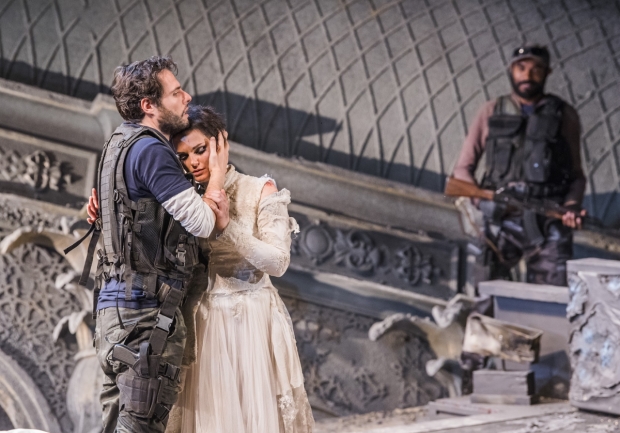Review: Hipermestra (Glyndebourne)
Britain’s premier summer festival opens with a spectacular staging of Cavalli’s opera

©Tristram Kenton
For an opera to languish unheard for centuries it must be pretty bad, you’d think. But Hipermestra, forgotten since 1680 until its recent rediscovery, turns out to be a jewel of the baroque. Though not one you can hum along to.
Let’s dive straight in and say it: Cavalli was none too hot on tunes. His melodic voice is heavy on recitative and light on arias; although if that sounds like a recipe for hours of secco singing, rest assured there’s gorgeous music along the way, mostly in the form of fleeting arioso passages. When it’s played with the luminosity that William Christie draws from nine members of the Orchestra of the Age of Enlightenment, time flies by.
The story is a mythic one, rich and strange. The 50 daughters of Danao, King of Argos (Renato Dolcini) are to marry the 50 sons of his brother, Egitto, in a joint ceremony. An oracle has predicted that the king will lose his land and his life to one of these fiancés, so he orders all the brides to slaughter their husbands on their wedding night. 49 of them obey.
Hipermestra is the daughter who cannot wield the knife because she truly loves her Linceo. Instead she helps him escape, confesses her crime and is imprisoned. Alas, poor Danao: as in every fate story from Oedipus to Drag Me to Hell, he learns the hard way that oracles tend to know their stuff.
By now you’ll have a sense of the opera’s whimsy. It’s dark but fanciful, and in the characters of Vafrino (Anthony Gregory) and the nurse Berenice (Mark Wilde, bearded and be-dragged) there’s plenty of potential to leaven the tone. However, director Graham Vick has gone full-on gloomy for his Glyndebourne staging and relocated the action to an unnamed war-torn country in today's Middle East.
'There’s always a giant peacock around when you need it'
Aside from being the fastest-growing cliché in opera, it's a setting that sucks the joy out of the piece. I’m puzzled as to why creatives are only prepared to exhume a rarity if they can stitch some contemporary message onto it; as it is, Hipermestra, an unknown work, is forbidden from existing on its own terms.
Paradoxically, Vick and his designer, Stuart Nunn, have sensed that the audience needs help so they’ve thrown coup after coup de théâtre onto the stage. I won’t spoil them here, but you never saw so many expensive tricks. I was half expecting a helicopter to land.
The production’s three hours of music would have exceeded four if Christie and Vick had not scissored the opera’s scenes of celestial intervention. Only one godly fragment remains: the rescue of Hipermestra from her attempt at a Tosca-like suicide. (Even in war-torn Blanki-Arabia there’s always a giant peacock around when you need it.)
Emőke Baráth was a radiant Hipermestra and Ana Quintans sang limpidly as her confidante Elisa. As the loyal general Arbante, tenor Benjamin Hulett confirmed his growing reputation, and Raffaele Pe did his best to inject some character into the wan countertenor lines of Linceo.
Why does Vick run the first two acts (125 minutes) without a break? The answer becomes clear as the curtain rises for the brief finale, though it meant that Glyndebourne‘s long picnic interval ran through the 21st hour on a chill May night. As it was, the tale’s screw had turned to the full even before the punters hit the Prosecco. All that remained was for the surviving principals to sort out their issues before everyone trooped home, whistling the scenery.
Hipermestra runs in repertory at Glyndebourne until 8 July.












